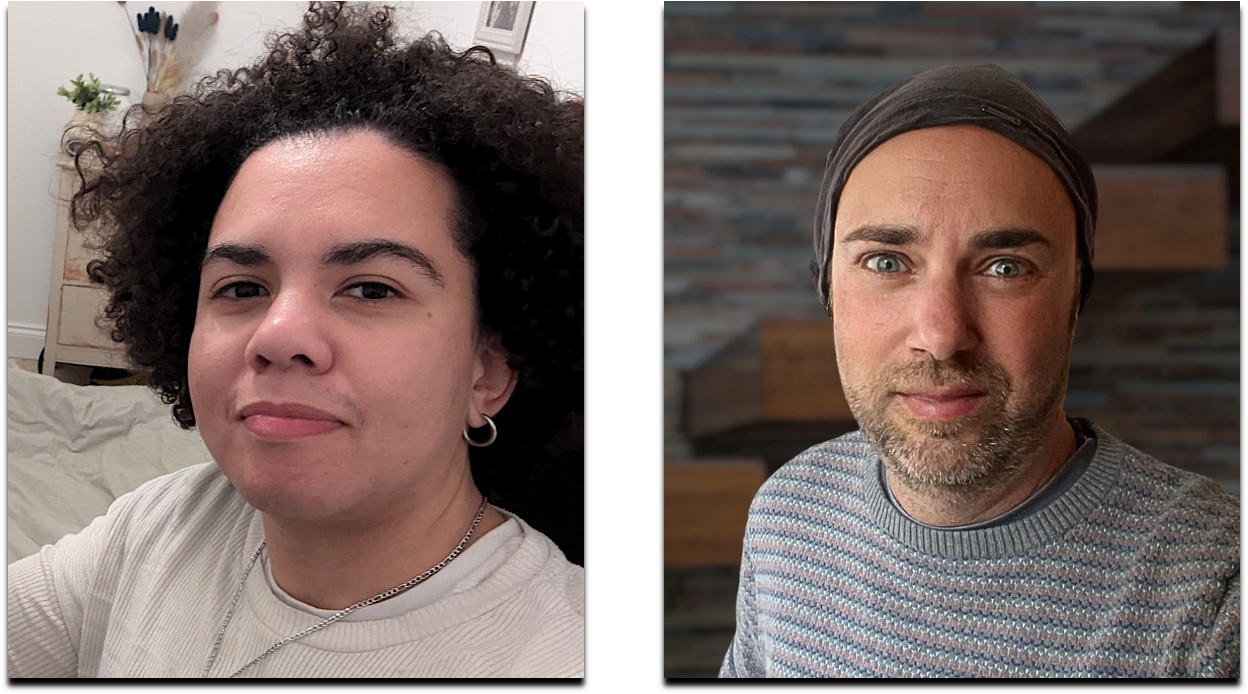The Myth of ‘Detransition’
There’s no going back for “detransitioned” butches—only learning to live on a strange little island.
Reality’s Last Stand is a reader-supported publication. Please consider becoming a paying subscriber or making a one-time or recurring donation to show your support.
About the Authors
Keira Bell is a techie and a drummer, known for her 2020 legal challenge against the Tavistock’s Gender Identity Development Service in the UK. Follow Keira on X: @KBtheYoungOG
Aaron Kimberly is a graduate researcher studying and theorizing the sexual assaults of transmen after a 17-year career as an RN with a psychiatric nursing focus. Follow her research at aaronkimberly.com
Imagine being a cat that looks exactly like a dog. You know you’re a cat, but you bark like a dog. You have a long snout like a dog. You wag your tail like a dog. Your hair is coarse. But, you’re not a dog. You’re a cat. Other dogs run up to you, tails high, wanting to play chase-your-tail games and slobber all over you. You can play along, in part. You naturally share some of their traits. But they also kind of freak you out, because you’re still, after all, a cat. They’d probably eat you if they found out.
A few other cats are nearby, curled up on a warm patch of pavement under a golden shard of sunlight. They groom their soft fur, watching you side-eyed from afar. They haven’t much time for you. To them, you’re a lesser beast. Suspect. At best, coolly tolerable; at worst, a mortal enemy. You’d love to share a bit of that warm concrete, but you’re still nursing a gash on your nose from the last time you tried.
That is what “detransition” feels like for us. We are women—masculine women, butches—who spent years on testosterone and have now stopped. People assume that the moment we say, “We know we are women,” the ordeal is over. It isn’t.
There are as many different pathways through “detransition” as there are through “transition.” We don’t speak for everyone. Men and women who transition and later detransition are not the same. Homosexuals and heterosexuals who transition and detransition are not the same. How long someone was on testosterone, and at what age they started, also matters.
But our experiences overlap enough that we can say this: detransition does not mean going back. It means stopping. And stopping, for those of us who passed as men for years, feels like running out of fuel in the middle of nowhere. Uncharted, unfamiliar terrain. Everyone seems to have an opinion about how we navigate it, though we’ve noted their hands are equally empty. No compass. No map.
As butches, we already had traits considered masculine. We were never pretty princesses. Aaron admits to the grace of a moose. We don’t carry purses; we stuff our pockets. Add testosterone onto that, and we easily and completely pass as men. Our voices dropped to a male register. Our hairlines receded. We grew beards. Our breasts are gone. None of that is reversible.
People say, “Well, just shave your faces. Try a dress. What about a wig?” Um—no. We’re butches. We didn’t wear dresses before. Why would we start now? As for the facial hair, I (Keira) had laser removal. It grew back. I (Aaron) shaved my face. I look like a clean-cut man. By midafternoon… well, they call it five o’clock shadow for a reason. Why bother with razor burn? While I (Keira) still have a thick head of hair, Aaron does not. Some has grown back after twenty months off testosterone, but the male-pattern widow’s peak is forever. And when we open our mouths and speak—game over. Any woman who might have begun to cautiously register our femaleness on close inspection immediately recognizes our trespass at the sound of our gravelly voices.
We have empathy for other women. We understand how “trans” has impacted the entire lesbian community. We understand that they’ve lost their spaces. We understand that they feel betrayed. We see the importance of single-sex spaces just as much as they do. What are we to do now?
The few times I (Keira) have attempted to use the women’s facilities, I’ve been called out or had security alerted that there’s a man in the bathroom. Saying “It’s ma’am!” doesn’t cut it. I make women uncomfortable in their spaces. I’ve been butt naked on a table for laser hair removal, and the technician still thought I was male.
I (Aaron) have been told that I’m not welcome back into lesbianism unless I consider myself as both a “victim” and a “predator.” I’ve been called ugly and unsuccessful, despite a fifteen-year nursing career at a senior level. Rumours have been circulated that I’m actually a man pretending to be a lesbian to get into women’s pants. Others have threatened that I’ll be hounded, harassed, and stalked unless I take steps to “properly” detransition. I’m a lesbian, yet treated as if there’s a secret sapphic membership club and my swipe card will forever be lost in the mail. Poor mental health, low self-esteem, endless groveling, more experimental medical procedures, or wearing dresses for the first time ever seem to be the pre-requisites for reentry into lesbianism. No thanks.
The demands are unreasonable. We can never undo what we’ve done. We look like men. We sound like men. None of that changes biological reality or lessens the importance of single-sex spaces. We’re not trying to undo or put a stain on any of the progress made in the fight against transgender ideology. We simply want to raise awareness and provide realism and honesty, as we always have.
We don’t see ourselves as victims. We’re learning to live with this, just as everyone learns to live with their particular difficulties. But pretending that years of juicing up on artificial testosterone make no difference—that we can simply walk back into our old lives unchanged—is absurd. We’re in a kind of Escape Room surrounded by incomprehensible puzzles. If it truly made no difference, if we could pretend it all away, then why would anyone care about people altering themselves in the first place?
Yes, there are only two sex categories: male and female. Yes, we are altered women. But it is easy for women who haven’t experienced what we have to simply declare, “Trans isn’t real,” and call it a day. If only it were that easy. Can someone be born in the wrong body? No. Can someone change their sex? No. Obviously not. While we agree that the concept of a “transgender identity” isn’t real, there is a reality that the concept of transsexualism has created—a chemically induced state that can’t be undone, with very real social implications.
We agree and reiterate that one’s sex is integral to one’s being, which is precisely why there needs to be more discussion about the psychosocial difficulties that arise when you are perceived as the sex you are not. People like us are growing in number. It’s a mind-fuck, no matter how stable you are in yourself. We don’t waste our energy correcting people every day—nor would it always be safe to. The real world isn’t X (Twitter). ALL CAPS DOESN’T MAKE WHAT YOU SAY MORE TRUE. We hope more people will try to understand rather than demand—in 280 characters or less—as though this complex problem has easy solutions.
“We can always tell.” No, you can’t. You want to be able to. You want the world to make sense, to have tidy boxes clearly labeled. That impulse is both part of the solution and part of the problem. Butches never fit neatly into a little box—a problem we tried to fix. Now we’re stuck in a new box, armed with screwdrivers and a handful of nails.
Language fails us. There’s no word for our reality that satisfies everyone. Our exile is both linguistic and literal. When we call ourselves “butch,” women who hate the word “trans” still get angry—they don’t want what we’ve done to be associated with butches. So I (Aaron) retreated back to “transman.” Not because I believe I’m a type of man. Not because I believe I was born in the wrong body. Not because I believe I have “man’s brain.” But because there is no path back. It’s delusional to think otherwise. This is permanent.
Butches who take testosterone pass too well. “Trans” means to cross over. In our case, that crossing isn’t a sex change. Trans, for us, is a permanent crossing into no-man’s-land, whether we like it or not. Still, we get to be happy. We get to be whole.
We hope no more butches make the journey to this strange little island. But we are grateful to know and love one another here. We claim it as our home. No boys allowed. And we don’t want a flag. Salamanders grow back limbs. Humans do not.
If you enjoyed this free article, please consider upgrading to a paid subscription or making a recurring or one-time donation below to show your support. Reality’s Last Stand is a reader-supported publication, and your help is greatly appreciated.














This sounds dreadfully, emotionally painful.
Thank you for telling your story. Im afraid that all I can offer is "Wishing you well." But I do.